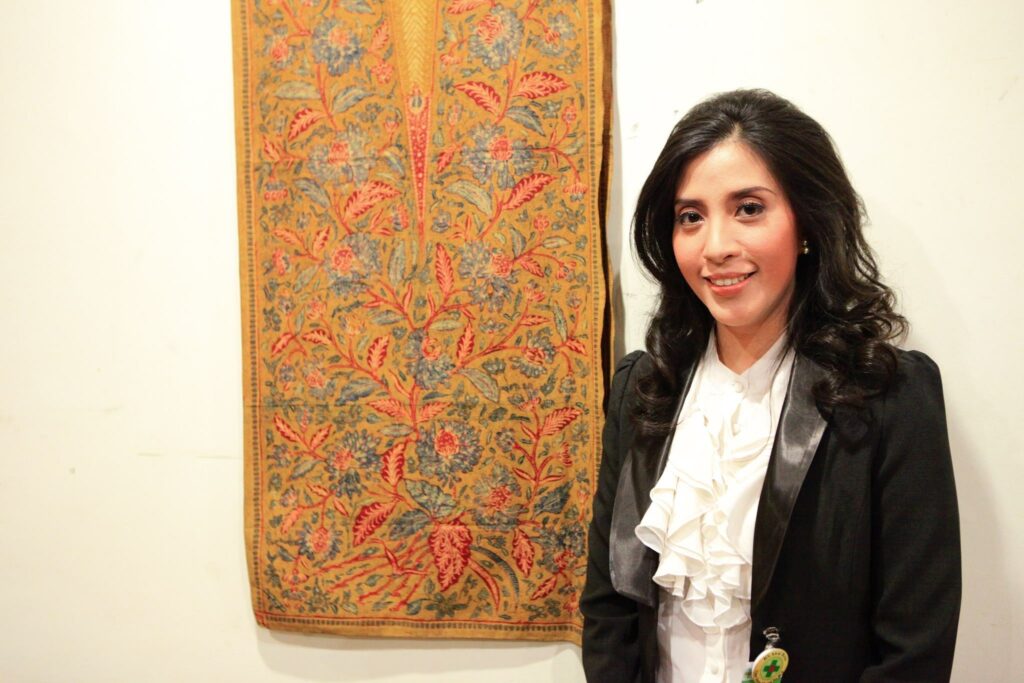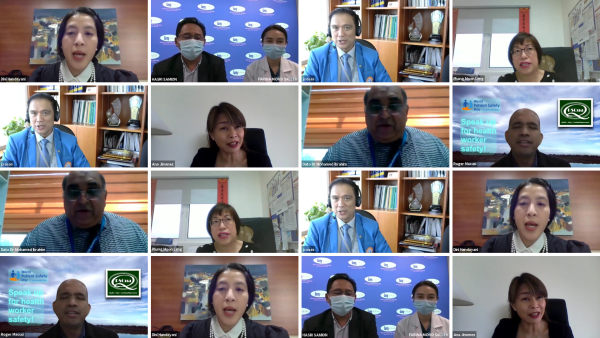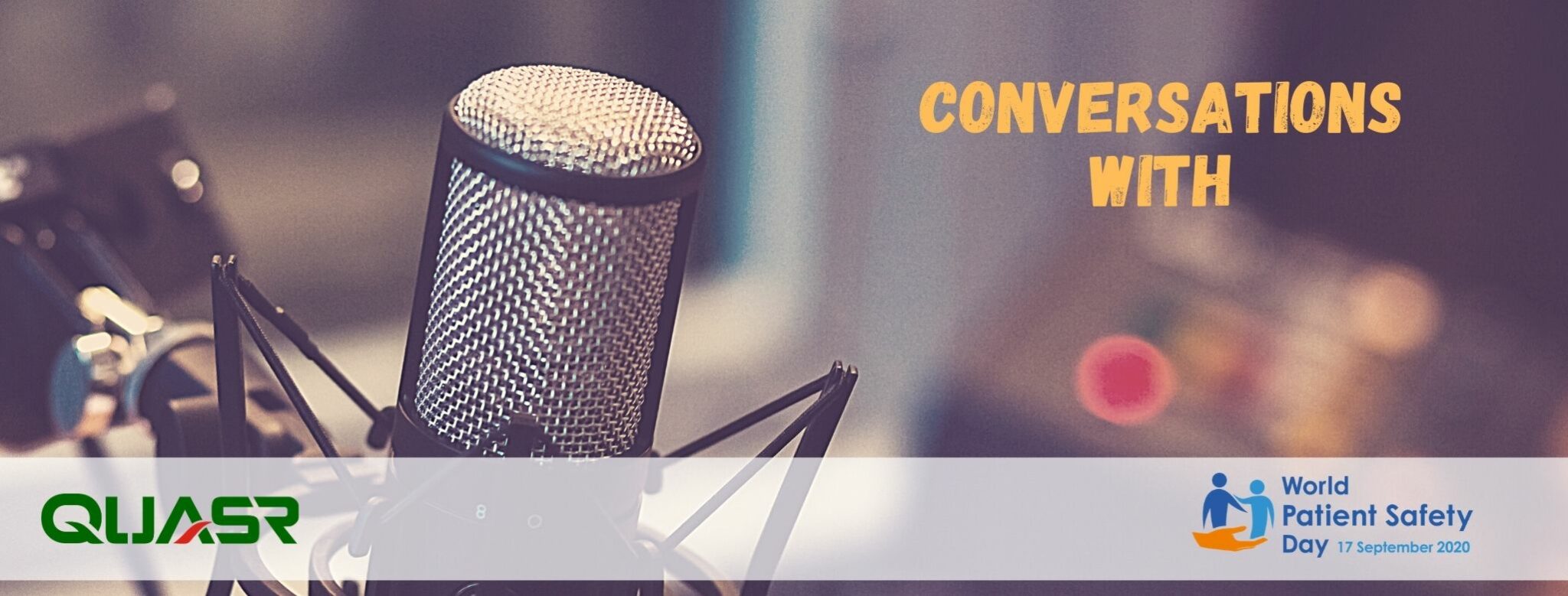In conjunction with World Patient Safety Day (WPSD) 2020, QUASR is organising a series of interviews with healthcare leaders to share their thoughts and to join the call for action to protect and support health workers.
Dini Handayani, MD, MARS, FISQua is the CEO of Medistra Hospital, Jakarta, Indonesia. She is a member of National Patient Safetey Committee of Indonesia Ministry of Health, International Surveyor for JCI (Joint Commission International), a member and fellow of International Society for Quality and Healthcare (ISQua), and a member of ACHE (American College of Healthcare Executive). Dr Dini is also the Ambassador of Habitat for Humanity Indonesia.

In this interview, Dr Dini speaks with a wealth of knowledge on safety culture, managing safety risks and crisis management. She also shares Medistra Hospital’s support for health worker safety and wellbeing, digital initiatives and new service offerings. At the national level, Dr Dini relates the nationwide health worker safety campaign organised by MOH Indonesia and WHO South-east Asia Regional Office; and the role of accreditation agency in developing infection prevention and control training programmes.
We take this opportunity to thank Dr Dini for accepting our invitation and sharing her thoughts and the experience of Medistra Hospital.
Here is an excerpt from the video interview with Dr Dini
What follows is an edited transcript of the virtual interview between Dr Dini and Hak Yek Tan, Founder & CEO of QUASR.
Hak: What are your thoughts on WPSD theme “Health Worker Safety: A Priority to Patient Safety”
Dr Dini: This year’s WPSD theme is a tribute to health workers around the world for their commitment in the fight against Covid-19. Many health workers especially the frontline workers, have lost their lives. We knew very little about the virus at the beginning and it was a struggle and learning process for all countries, not only in Asia but also in Europe and the US. The theme on health worker safety is very important in promoting awareness on health worker safety globally, especially during this pandemic.
Hak: How did Medistra Hospital celebrate WPSD and support health worker safety and wellbeing?
Dr Dini: We celebrated WPSD this year by acknowledging our low infection rate on Covid-19 among our staff. From February to end-October, our staff infection was below 5%. It has been a lot of hard work to maintain our safety behaviour during this time and we are very proud to achieve that. We pay tribute to our staff by giving assurance on safety and security that they will receive the safest practice in delivering services.
We give our staff the appropriate PPEs, avoid long hour shifts by adding more staff to cover for each shift especially in the Covid-19 isolation area, give vitamins and supplements to boost immunity and provide a new open-air dining room. A zoning area to treat Covid and non-Covid patients is designed to ensure a good flow of infectious and non-infectious patients. We also develop a convenient and proper staff screening flow to check their health status upon treating or exposure to Covid-19 patients. We give security and emotional support by having regular meetings with each unit to know how we could support them better.
“Health workers are our frontline assets. They need to be safe and secure first before delivering any services. Keeping them safe and secure is definitely a requirement for me”
For me and our senior management, we are being present at all times. We did not work from home during the pandemic so that our staff know we are going through this together. I think this provides a good emotional support for our staff. I’m also sending them thank you cards for always be there for us and to stay safe and health. For this WPDS, we provided treats – a pizza day – for everyone. This is one of the things we can do to try to keep up a good spirit.
Hak: What is your overall view on safety culture in the healthcare industry?
Dr Dini: I think hospitals in many countries are still struggling with safety culture. This is because a culture of safety is the core value and behaviour that come about when there is a collective and continuous improvement and commitment by the organisational leadership, managers and all health workers to emphasise on safety, among many competing roles and objectives.
Safety culture is a very big concept with numerous activities. To successfully implement this concept requires a huge driven power, starting from the Board to the CEO, senior management team, the physicians down to all the staff. Getting everyone onboard is definitely a continuous journey which usually takes a while for the organisation to change it culture.
“The first thing we need to build a safety culture is the awareness that it involves everyone in the organisation”
Hak: You are a member of the National Patient Safety Committee. Was there any national campaign on health worker safety?
Dr Dini: We had a very good campaign for health worker safety nationwide together with the Ministry of Health (MOH) Indonesia and WHO South-east Asia Regional Office. Our campaign asks health workers nationwide to speak up and raise the issue to hospital management upon any conditions that may cause harm to hospital staff. It was a big event with numerous nationwide media coverage. We are very happy with the campaign and believe that it has created awareness for everyone, especially among health workers in Indonesia.
“With increasing number of Covid-19 cases and mortality among health workers, this is a priority for MOH and for Indonesia to wake up and speak up for health worker safety”
Hak: As an international surveyor yourself, what do you think are the roles accreditation agency can play?
Dr Dini: I think this pandemic is a good moment for us to learn new things. Accreditation agency, hospital management and healthcare professionals should work hand in hand to create impactful training programmes together. Once the awareness is already there, the accreditation agency can offer consecutive training programmes and give hospitals updated resources on infection prevention and control. This will ensure that we can learn from these good programmes on how to protect ourselves. I believe some of these have already been done nationwide by the accreditation agency.
“The need to create awareness on health worker safety starts with individuals to speak up under any circumstances of harm…this is the key to engage management to pay attention to the situation and improve”
Hak: How does Medistra Hospital manage safety risks?
Dr Dini: We manage safety risks of this pandemic from the clinical aspect and facility aspect. From the clinical aspect, we make sure that patients are given the best treatment possible to prevent mortality and complications from comorbid factors such as diabetes, obesities, heavy-smoking patients and others. Our Covid-19 management team is part of the nationwide Covid-19 management team under MOH, comprising of the most resourceful professors and senior doctors in Indonesia. Medistra is one of the private hospitals with the lowest Covid-19 mortality rate in Indonesia.
For facility risks, we add specific zoning for Covid-19 and non Covid-19 patients throughout the hospital. We have drafting facilities, hyper-filtering systems, additional areas for gowning and drafting, conduct regular high-level disinfection for all surface areas, fogging system, temperature screening camera, touchless button for lifts, ensuring the profiling and availability of PPF or all staff.
Hak: Is Medistra Hospital offering any new services?
Dr Dini: We have added new services like telemedicine, Covid-screening programme, isolation centres at nearby hotels (“fun-solation”) where customers can have other activities like fun games, sunbathing, ping-pong, billiards and watching movies. Medistra Hospitals is also the appointed Polymerase Chain Reaction (PCR) laboratory for the Presidential Office, embassies, MNCs and several prominent international airlines. There are many referral hospitals for Covid-19, most of them are government hospitals. Over time, Medistra has become the leading hospital for PCR testing in Jakarta and Indonesia. We have 6 to 8 types of PCR equipment with different levels of virus detection capabilities. Medistra is now the leading private hospital for PCR testing in Jakarta and Indonesia”
Hak: Could you briefly take us through how you responded to Covid-19 pandemic?
Dr Dini: I joined Medistra in January 2020. When the pandemic hit, the first thing I did was to set up a single communication line. Establishing a clear line of communication and solid command centre from the leadership is the key in crisis management to ensure everyone receives the same information. Following that we set up zoning areas and many other facilities were set up overnight. Overall we had a smooth and effective communication across all aspect of the hospital operation.
“A clear communication line and solid command centre is the key in crisis management”
In JCI standard, there is a chapter on Prevention and Control of Infections. There is also a specific provision on disaster preparedness where hospitals are required to develop, implement and test their emergency preparedness programmes as a response to global communicable diseases. This pandemic is a very good test for all of us on emergency preparedness. It is a learning process. In the meantime, there will be more issues and additional resources and trainings that will be required.
“This pandemic is a lesson learned for everyone and prepares us on how we should be providing healthcare services in the future”
Hak: How do you see the pandemic accelerating IT adoption and digital transformation in healthcare?
Dr Dini: Digitalisation is the game-changer as well as the opportunity for healthcare providers to gain advantage over competition. The pandemic provides the opportunity for digital transformation more than we can image. It pushes us over the boundaries of care delivery both onsite and online. Hospitals need to create an online service delivery platform to be competitive in future.
Medistra Hospital has implemented several new digital initiatives during Covid-19. We added a web-based app for Covid-19 patient monitoring connecting to our existing EMR system. Starting with screening questionnaires, to the overall monitoring of Covid-19 patient conditions online and creating dashboards for each patient. “Medistra Hospital has implemented three digital initiatives. Namely a web-based app for Covid-19 patient monitoring, telemedicine and a breath screening app for our staff.”
The second initiative is telemedicine. In Medistra, our cases are mostly complex and chronic patients. Therefore we design our service lines to be very specific around patient needs and age sensitive-based. Our patients are mostly above 40, very loyal and choose quality over price. Patients above 60 are the most conservative to telemedicine as we know. So we offer our telemedicine services differently to be closest to the real patient feel and to provide a good customer experience. We develop a special portable telemedicine suite-case containing digital stethoscope, portable ECGs, digital thermometer, digital blood pressure monitor, HD camera video call equipment. The suite-case is connected to our web-based data storage and EMR. All the patient information from the bar-code registration and the examination results will be automatically sent to the doctors prior to the video consultation. We deploy this portable suite case to patient’s house accompanied by our nurses. The patients will have their consultation based on real-time data just exactly as they did prior to the pandemic.
The third initiative is the implementation of breath screening application for our staff. This is in addition to the different PCR testing methods currently available.
“One of the legacies of Covid-19 is the major transformation on digitalisation in healthcare. It will outlive the pandemic. There is a lifestyle change…so I think the demand is there and people are enjoying the new normal”
On the management side, integrated telehealth comes with the capabilities of patient data gathering, AI, reporting on clinical care and enhancing workflow management. Telehealth will be a source of patient referrals in the future and offers new possibilities in care delivery.
Hak: What are the key lessons learned?
Dr Dini: We have learned from the pandemic that hospitals need to embark on their own digitalisation plans and develop online platforms to supplement their onsite services. This is the future and there is no other options. The second lesson is that we need to make behaviour choices – wearing masks, social distancing and washing hands regularly – notwithstanding “the Covid-19 fatigue”. The third lesson is strong leadership is needed to successful manage and safely navigate a pandemic such as this.



